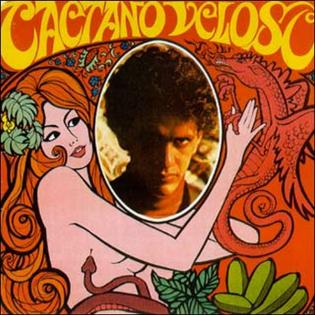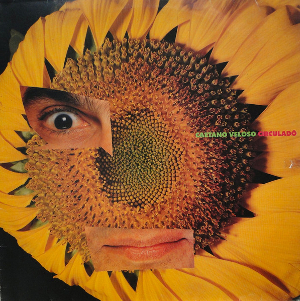Related Research Articles

Caetano Emanuel Viana Teles Veloso is a Brazilian composer, singer, guitarist, writer, and political activist. Veloso first became known for his participation in the Brazilian musical movement Tropicália, which encompassed theatre, poetry and music in the 1960s, at the beginning of the Brazilian military dictatorship that took power in 1964. He has remained a constant creative influence and best-selling performing artist and composer ever since. Veloso has won nine Latin Grammy Awards and two Grammy Awards. On 14 November, 2012, Veloso was honored as the Latin Recording Academy Person of the Year.

Gilberto Passos Gil Moreira, is a Brazilian singer-songwriter and politician, known for both his musical innovation and political activism. From 2003 to 2008, he served as Brazil's Minister of Culture in the administration of President Luiz Inácio Lula da Silva. Gil's musical style incorporates an eclectic range of influences, including rock, Brazilian genres including samba, African music, and reggae.

Os Mutantes are an influential Brazilian rock band that were linked with the Tropicália movement, a dissident musical movement during the Brazilian dictatorship of the late 1960s. The band is considered to be one of the main groups of Brazilian rock. Heavily influenced by Anglo-American psychedelic pop, they bridged Brazilian sensibilities together with studio trickery, feedback, distortion, and musique concrète. They released their now-acclaimed self-titled debut album in 1968.
Tropicália, also known as tropicalismo, was a Brazilian artistic movement that arose in the late 1960s. It was characterized by the amalgamation of Brazilian genres—notably the union of the popular and the avant-garde, as well as the melding of Brazilian tradition and foreign traditions and styles. Today, tropicália is chiefly associated with the musical faction of the movement, which merged Brazilian and African rhythms with British and American psychedelia and pop rock. The movement also included works of film, theatre, and poetry.

Roberto Carlos Braga is a Brazilian singer-songwriter, also known as "King of Latin Music" or simply "the King". Most of his songs were written in partnership with his friend Erasmo Carlos. Roberto Carlos has sold over 70 million albums around the world. He is considered one of the most influential artists in Brazil, being cited as a source of inspiration by many artists and bands. His net worth is estimated at US$160 million.

Música popular brasileira or MPB is a trend in post-bossa nova urban popular music in Brazil that revisits typical Brazilian styles such as samba, samba-canção and baião and other Brazilian regional music, combining them with foreign influences, such as jazz and rock.

Rita Lee Jones was a Brazilian singer, songwriter, multi-instrumentalist, presenter, actress, writer, and activist. Known as the "Queen of Brazilian Rock," she sold more than 55 million records, making her the most successful female artist by record sales in Brazil and the fourth overall, behind Tonico & Tinoco, Roberto Carlos, and Nelson Gonçalves. She built a career that started with rock but over the years flirted with various genres, such as psychedelia during the Tropicália era, pop rock, disco, new wave, pop, bossa nova, and electronic, creating a pioneering hybrid between international and national genres.

Gal Maria da Graça Costa Penna Burgos, known professionally as Gal Costa, was a Brazilian singer of popular music. She was one of the main figures of the tropicalia music scene in Brazil in the late 1960s and appeared on the acclaimed compilation Tropicália: ou Panis et Circencis (1968). She was described by The New York Times as "one of Brazil's greatest singers."
Alegria or Alegría (Spanish) or Allegria (Italian), means joy in English. It also may refer to:

Erasmo Carlos was a Brazilian singer and songwriter, most closely associated with his friend and longtime collaborator Roberto Carlos. Together, they created many chart hits including "É Proibido Fumar", "Sentado à beira do caminho", "Além do Horizonte", "Amigo" and "Festa de Arromba".
Tropicália ou Panis et Circencis is a 1968 collaboration album by artists including Gilberto Gil, Caetano Veloso, Tom Zé, Nara Leão, Os Mutantes and Gal Costa. Considered an important record in the Tropicália movement and in the history of Brazilian music, it features orchestral arrangements by Rogerio Duprat and lyrical contributions from Torquato Neto.

Caetano Veloso is the debut solo album by the artist of the same name, released in Brazil in 1968. He had released Domingo the year before in collaboration with Gal Costa. It was one of the first Tropicália efforts, and features arrangements by Júlio Medaglia, Damiano Cozzella, and Sandino Hohagen, as well as an eclectic assortment of influences, demonstrating the "antropofagia" of the Tropicália movement. Sounds from psychedelia, rock, pop, Indian music, bossa nova, Bahian music and other genres appear on the album. It includes the hit songs "Alegria, Alegria", "Tropicália", and "Soy loco por ti, América".

Caetano Veloso is the third self-titled album by Caetano Veloso. It was recorded in England, when the artist was in an exile imposed by the Brazilian military dictatorship for being subversive. It is mostly sung in English and portrays a sad tone throughout, reflecting his feelings about homesickness and the absence of his family and friends. It was released first in Europe, and then in Brazil, in 1971.
"Wave" is a bossa nova and jazz standard song written by Antônio Carlos Jobim. Recorded as an instrumental on his 1967 album of the same name, its English lyrics were written by Jobim himself later that year.

Rodrigo Amarante de Castro Neves is a Brazilian singer-songwriter, multi-instrumentalist, composer and arranger. He is part of the bands Los Hermanos, Orquestra Imperial, and Little Joy, and released his first solo record, Cavalo, in Brazil in late 2013 and worldwide in May 2014. He also wrote and performed the narcocorrido "Tuyo", the theme song for the Netflix Original Series Narcos (2015) and Narcos: Mexico (2018), and wrote the score for the film Entebbe (2018).

Maria Luiza de Arruda Botelho Pereira de Magalhães, known as Mallu Magalhães, is a Brazilian singer, songwriter and musician. Mallu first came to prominence through her MySpace page, becoming known for her own songs and those of other artists. She found herself gracing the covers of major newspapers such as Folha de S. Paulo, O Estado de S. Paulo and Jornal do Brasil, and was featured in Rolling Stone, Istoé, Época among others. In the first two years of career, she became the subject of countless blogs, packed shows, attracted critical attention, and had more than 4 million hits on her MySpace page. In 2008 she released her first eponymous album and in 2009 she released her second album, also self-titled. In 2013 she formed Banda do Mar, along with her husband Marcelo Camelo, and the Portuguese drummer Fred Ferreira. Their first album was released in August 2014. Mallu has a daughter, Luísa, born December 28, 2015.

cê is an album by Brazilian singer, songwriter, and guitarist Caetano Veloso. Released on 1 September 2006 on Mercury Records, the album took its title from the colloquial Portuguese word meaning you. It was written with Veloso's band in mind, which was chosen in part by guitarist Pedro Sá. cê received positive critical commentary; several critics specifically noted the album's lyrical focus on human sexuality.

Transa (transl. Lovemaking) is the sixth album by the Brazilian musician Caetano Veloso, released in 1972 by Philips Records. Like its predecessor, it was recorded while the artist was exiled in London, though he returned to Brazil shortly after completing it.

Araçá Azul is the fifth studio album by Caetano Veloso, released in November 1972 by Philips Records. The album was recorded shortly after Veloso returned from his exile in London. Araçá Azul is Veloso's most experimental album to date, influenced in part by the poetics of invention of the Brazilian concrete poetry movement and the experiences in popular music by Walter Franco. It was negatively received by the market upon its release, and is Veloso's lowest-selling album despite receiving critical acclaim.

Circuladô is an album by the Brazilian musician Caetano Veloso. It was released in 1991. Circuladô was Veloso's third album to be widely distributed in the United States.
References
- 1 2 3 Motta, Nelson (2001). Noites Tropicais . Rio de Janeiro: Objetiva. ISBN 85-7302-292-2.
- 1 2 Pareles, John (September 9, 1992). "At lunch with Caetano Veloso". The New York Times .
- 1 2 Veloso, Caetano; translated by Isabel de Sena (2002). Tropical Truth. New York: Knopf. p. 350. ISBN 0-375-40788-X.
- ↑ Terron, Paulo (2009). "As 100 Maiores Músicas Brasileiras – "Alegria, Alegria"" (in Portuguese). Rolling Stone Brasil. Archived from the original on October 7, 2013. Retrieved January 6, 2014.